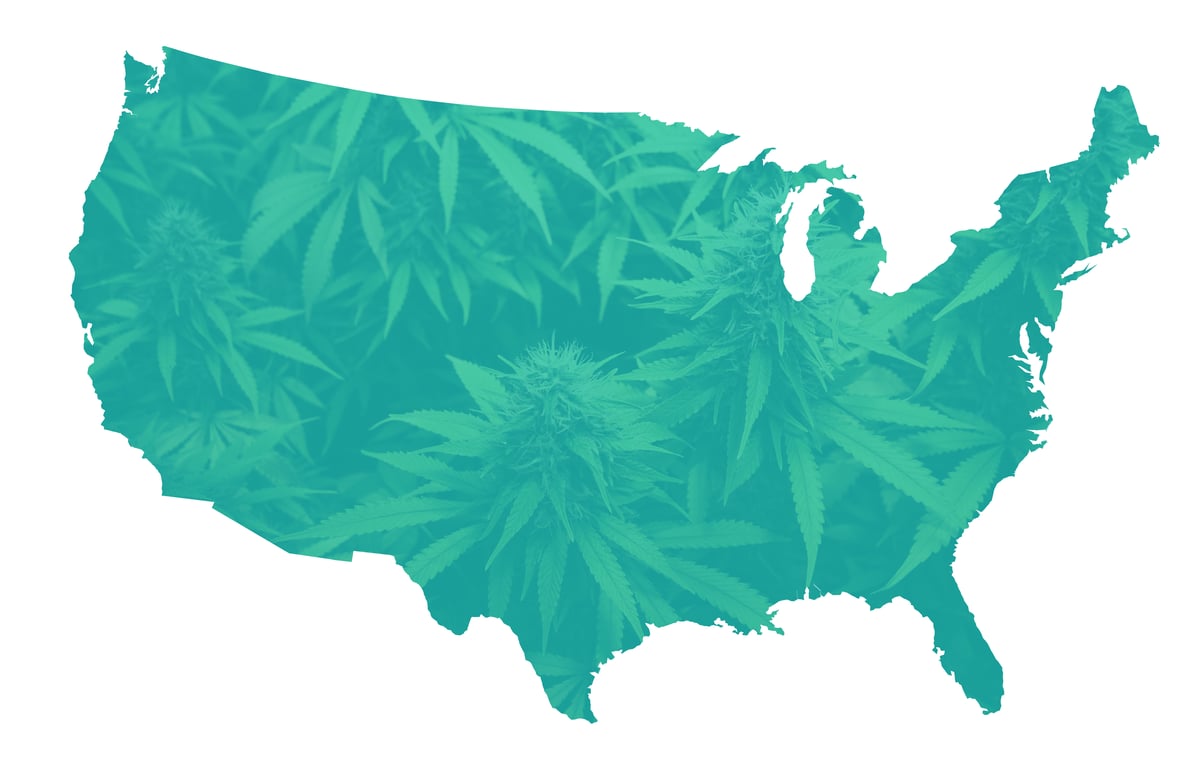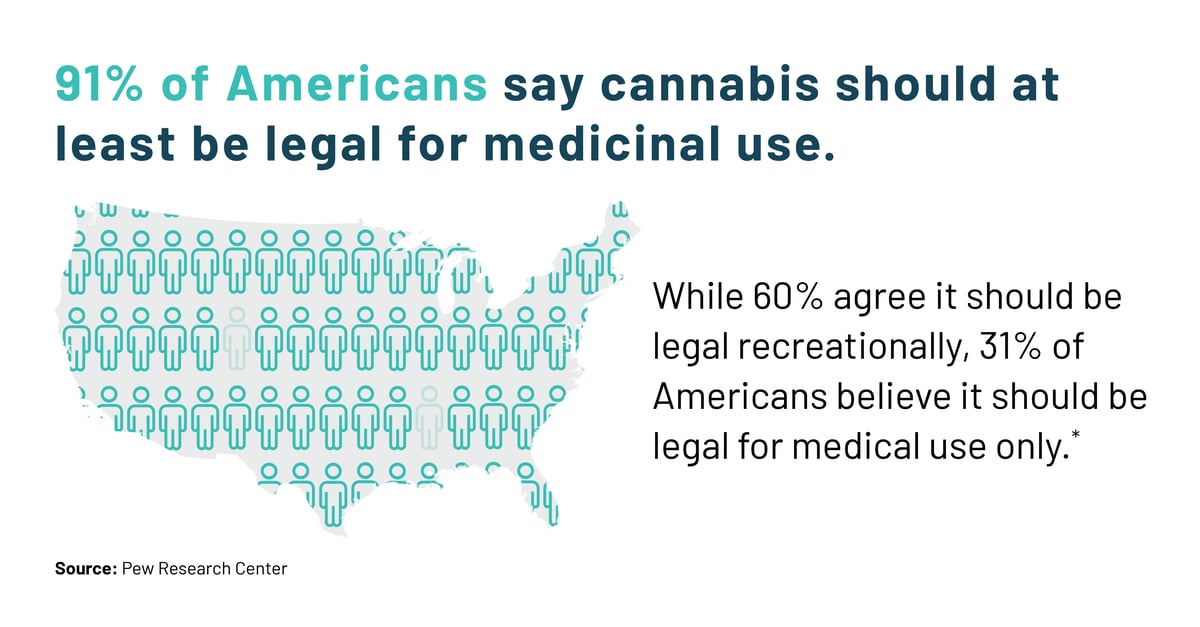We first saw a major shift in legislation with the 2018 Farm Bill. Also known as the Agricultural Improvement Act of 2018, it was finalized in December, setting up 2019 as an inflection point in state and federal understanding.
Fast forward to 2021, the evolving political and regulatory environment is continuously impacting the future direction of the cannabis industry. Major shifts in socio-political support have spurred momentum as progressive proposals have been put forth and support for legalization spreads across the country.
The Road to Cannabis Legalization in the US
The US cannabis industry has remained hopeful since President Joe Biden and the Democratic party gained control of the federal government in November 2020. Senate Majority Leader Chuck Schumer has committed to cannabis policy reform and kept advocates on their toes by saying a bill will come “soon.” Media outlets went as far as to say April 20, 2021, would be “the last illegal 420.”

Despite the hype, federal cannabis legalization will likely be an incremental process that starts with decriminalization. National legalization won’t be as easy as state legalization, which is already a messy process. The road to nationally legal cannabis will be long and winding. The federal government may not be ready for sweeping cannabis reform, but the general population appears to be.
Where is marijuana legal in the US?
As of 2021, 33 states and the District of Columbia have a medical-use program.
States where medical marijuana is legal:
|
|
Adult-use (recreational) is allowed in 19 states and the District of Columbia. The most recent states to approve legalized marijuana are New Mexico, Montana, and New Jersey in November 2020, New York in March 2021, and New Mexico shortly thereafter.
States where recreational marijuana is legal:
|
|
Is marijuana legalization popular?
Recent reports show 91% of Americans say cannabis should at least be legal for medicinal use, with 60% agreeing it should be legal recreationally too.

State-level legalization efforts and potential federal reform hover in the background as cannabis normalization continues. All types of people are turning to cannabis, and they are enjoying it for distinct purposes, at different times of the day, and in varying formats.
Currently, there are two key pieces of legislation that would strengthen and legitimize the United States cannabis market: the STATES Act and the SAFE Act.
STATES Act
The Strengthening the Tenth Amendment Through Entrusting States Act (STATES) was proposed in Congress in April 2019. The passing of this act would amend the Controlled Substance Act of 1970, which banned marijuana. It would eliminate the threat of federal prosecution for businesses and individuals involved in the regulation, manufacture, production, possession, distribution, administration, or sale of marijuana products in accordance with states’ laws.
In a recent document issuing guidance around the STATES Act Senators Elizabeth Warren and Cory Gardner write:
“The Strengthening the Tenth Amendment Through Entrusting States (STATES) Act ensures that each State has the right to determine for itself the best approach to marijuana within its borders. The bill also extends these protections to Washington D.C, U.S. territories, and federally recognized tribes, and contains common-sense guardrails to ensure that states, territories, and tribes regulating marijuana do so in a manner that is safe and respectful of the impacts on their neighbors.”
The document also confirms, “[...] 46 states have laws permitting or decriminalizing marijuana or marijuana-based products.” This includes Washington D.C., Puerto Rico, and Guam.
SAFE Act
Banking has been a significant challenge for cannabis businesses during federal prohibition. The SAFE Banking Act aims to lift penalties on financial institutions that work with cannabis-related legitimate businesses (CLBs), giving the industry access to formal banking services. This will make it easier for cannabis brands to do business and for new companies to gain the capital and security necessary to enter the space.
Legal banking provides opportunities for major players to enter and expand in US cannabis. Companies in similar industries— like tobacco, alcohol, and even wellness supplements—see a future for themselves in US cannabis. That future will become a reality only if banking access is legal for CLBs.
As it stands, companies using federal banking services with existing portfolios cannot risk their core business by getting into cannabis. Without this barrier, US cannabis is closer to receiving an outpouring of investment from players currently too concerned to enter the market. Legal banking will encourage more states to legalize cannabis.
The current model of cash-only cannabis establishments has left some state governments on the fence. Regulating a market operating outside of traditional financial infrastructure is no easy task. With the SAFE Banking Act, this barrier will be lifted. CLBs will have access to banks and credit unions, allowing them to act largely as any other business would. The ability to write checks, accept credit cards, and use payroll providers will make it easier for states to regulate safe, legal cannabis markets.
Legal Status of Cannabis in the US Will Continue to Evolve
Cannabis is no longer a strictly partisan issue. Republican and Democratic voters are saying “yes” to legal cannabis. Four states with republican governors— Arizona, Mississippi, Montana, and South Dakota—saw their citizens vote for cannabis legalization in November 2020. To further illuminate cannabis’ bipartisanship, 57% of Montana voters said “yes” to legalizing cannabis while 57% also voted for former republican president, Donald Trump.
But Republican state governments are not siding with their voters. Mississippi voters will not see legal medical cannabis despite 74% voting for it. The state’s supreme court ruled the ballot initiative unconstitutional in May 2021—the first case of a state overturning a cannabis ballot initiative. South Dakota will likely follow in Mississippi’s steps after Republican Governor Kristi Noem took adult-use legalization to court. In addition, the Florida Supreme Court ruled to prevent cannabis from coming to the ballot in April 2021. Political party members have not always adopted a cannabis-friendly stance, even when voters have.
Conflicts between state governments and the will of their citizens may continue as part of the long road to national legalization. State supreme courts have made it harder to legalize with ballot initiatives. For now, we know the consumers are ready for it when the governments are.
What is driving cannabis normalization? Read the latest US Cannabis Market Update




